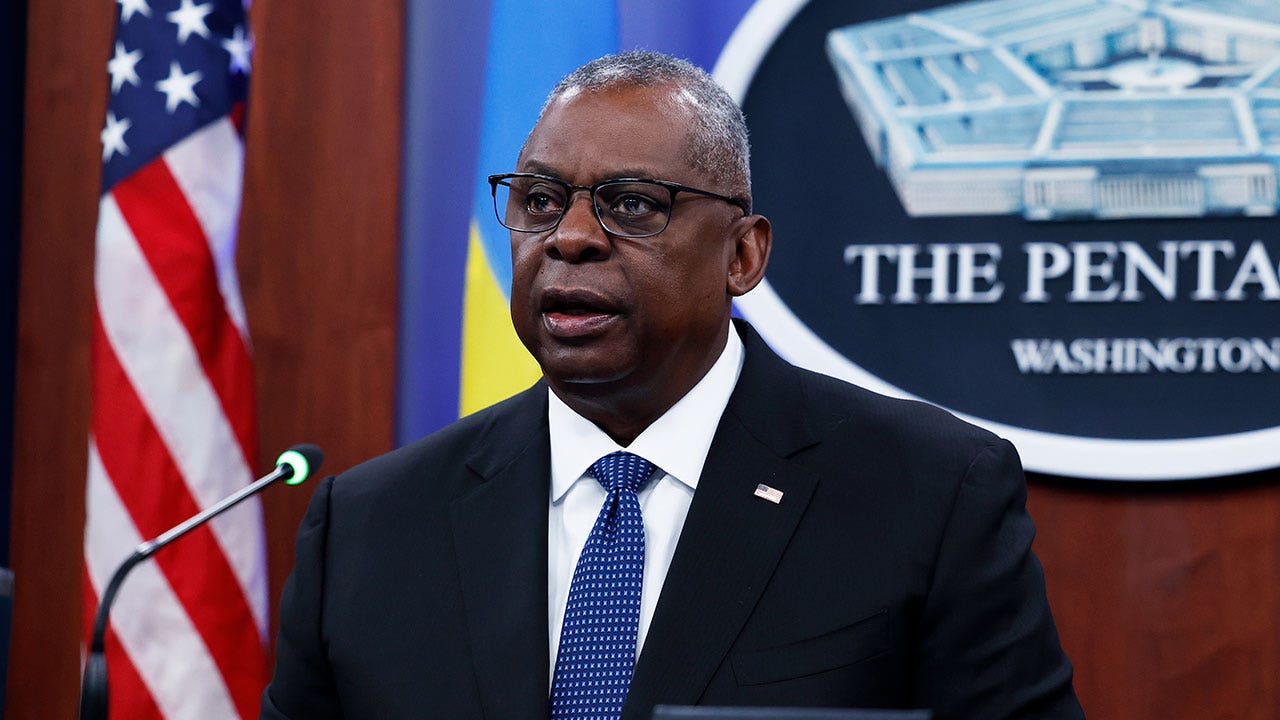Business
Column: Right-wing hatemongers count on the cowardice of companies such as Target
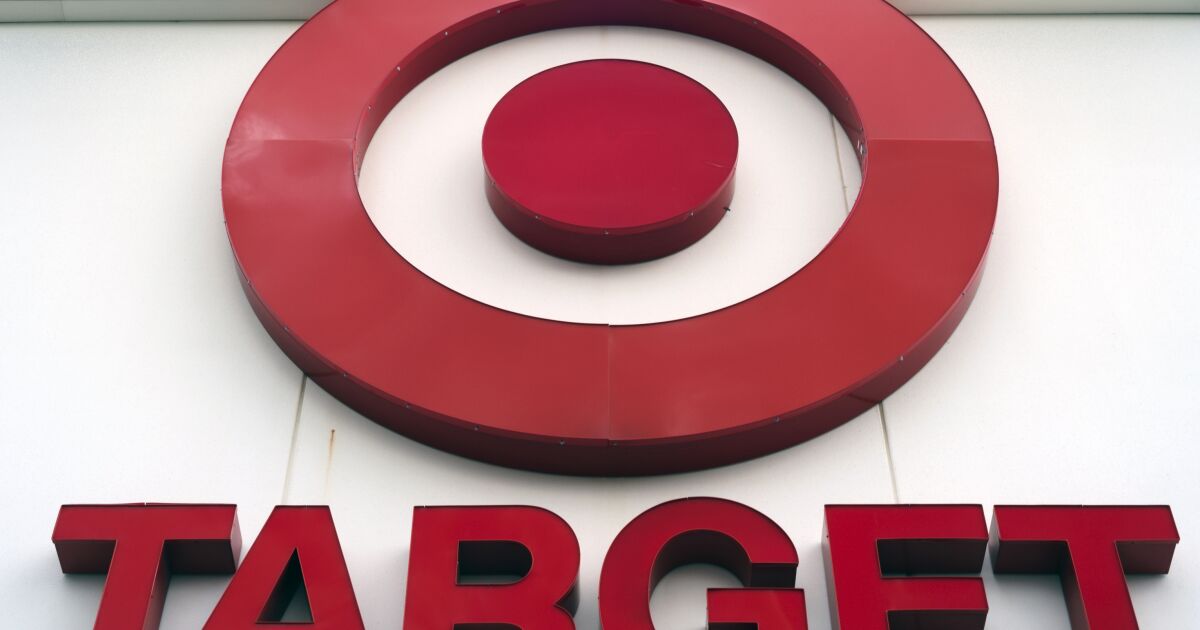
If there’s a company in America you’d expect to have the gumption and spirit to see off a stupid and specious attack on the selling of LGBTQ+-themed merchandise for Pride Month in June, it would be Target.
After all, the Minneapolis-based company is one of America’s biggest retailers, racking up more than $100 billion a year in sales. Only two weeks ago, its chief executive, Brian Cornell, was boasting that “our long-standing commitment to diversity, and equity, and inclusion … has fueled much of our growth over the last nine years.”
Yet when the braying mob of anti-LGBTQ+ reactionaries targeted Target, the company folded like a cheap off-the-rack suit. It told personnel in many stores to shrink or even eliminate their Pride-themed merchandise displays or move them to less conspicuous sections of the stores. Some LGBTQ+ designers say their products have been taken off the shelves.
Target explained its reaction by citing physical threats to its store workers from anti-LGBTQ+ militants. But something more is going on here, and Target’s response doesn’t show the company in a good light.
The context is a concerted effort from the right wing to demonize the LGBTQ+ movement and thereby make any outreach or even acknowledgement of this community toxic for consumer businesses. The goal is to disappear these people and their advocates, reversing a decades-long trend toward acceptance, equity and inclusion.
“Our long-standing commitment to diversity, and equity, and inclusion…has fueled much of our growth over the last nine years.”
— Target CEO Brian Cornell, just before the company downplayed its merchandising of Pride-themed goods
The attacks take many forms, all of them chiefly employed by Republicans and their right-wing acolytes and all of them equally factitious.
Sometimes LGBTQ+ people are accused of being pedophiles who “groom” children for abuse. Sometimes the anti-queer movement is cast as an arm of the right’s attack on “wokeness,” which is just another way of promoting the idea that only straight white males count in this U.S. of A.
Anti-”wokeness” is the chief theme of Florida Gov. Ron DeSantis’ presidential ambition tour. As is well known, DeSantis has been on the warpath with Walt Disney Co., one of his state’s leading employers and economic engines, over the company’s public criticism of his so-called “Don’t Say Gay” law, which suppresses classroom references to gender identity.
(During his glitch-beleaguered May 24 presidential campaign launch on Twitter, DeSantis ludicrously accused Disney of “trying to inject matters of sex into the programming for the youth.”)
There’s no evidence that anti-queer militants comprise anything but a tiny minority of the American public. When they act in concert and their efforts are fueled by social media, however, they can appear to be weightier than they are.
That’s probably what accounted for the pusillanimous reaction of Anheuser-Busch to a right-wing, social-media driven campaign against its Bud Light beer, after the company’s marketing department launched a publicity campaign with transgender influencer Dylan Mulvaney.
Anheuser-Busch not only issued a wan statement of regret for the marketing outreach, but sidelined the two marketing executives responsible for the campaign. Given that their assignment had been to revive the brand’s fading popularity, Anheuser-Busch’s effective demotion of the executives signaled to the boycotters that their voices had been heard. That wasn’t a positive corporate message, to say the least.
Anheuser-Busch stock has fallen by about 20% in the last two months, while the boycott has been in full cry. Target shares have fallen by about the same percentage since mid-May.
To some extent, it’s unfair to blame the far-right for launching boycotts against brands they choose not to like. I’ve defended consumer boycotts in the past, in principle. But all boycotts are not created equal.
There’s a qualitative difference between those directed at noxious behavior, such as the open racism of Tucker Carlson or the bloodlust of the National Rifle Assn., and those directed at efforts to promote tolerance and equality. One knows boycotters by their boycottees.
That brings us back to the companies’ hasty responses. These have been widely misjudged. Alex Shepherd of the New Republic cursed “total, preemptive capitulation” by Anheuser-Bush and Target to the anti-LGBTQ+ boycotts as “profoundly un-American.”
If only they were. Corporate America’s response to even a hint of controversy, no matter how specious the boycotters’ objections, is as American as apple pie. As we’ve seen time and time again, consumer companies are notable not for their steadfastness in defending the public interest, but their cravenness. That’s especially so when, as is the case with the Bud Light and Target campaigns, the context is overtly partisan.
Remember all the companies that pledged to cease or at least suspend campaign contributions to the 147 Republican representatives and senators who voted to overturn the 2020 presidential election? Many, if not most, have gone back on their promise.
Among them, according to ProPublica, are Home Depot, which by the end of 2022 had donated to 65 of the election deniers, and Boeing, which funded at least 74. Toyota, to give it begrudging credit, was at least candid about the thought process involved in resuming contributions to supporters of the Jan. 6, 2021, insurrection: It selected politicians that could carry its water in Washington.
“Toyota supports candidates based on their position on issues that are important to the auto industry and the company,” the company told me in June 2021. “We do not believe it is appropriate to judge members of Congress solely based on their votes on the electoral certification.” To put it another way, “money talks, democratic principle walks.”
Many corporations will say for the record that they believe in women’s healthcare rights. But when a horrifically punitive anti-abortion law went into effect in Texas in 2021, the silence from the corporate community was deafening. It still is; not a peep of protest has come from Texas-based big businesses such as American Airlines, Texas Instruments, Dell and Hewlett Packard Enterprise — even though the law is certain to make recruiting women for important jobs harder for them.
One problem in assessing the campaigns against Bud Light and Target is a lack of clarity about their results. It’s hard to be sure whether Bud Light’s continuing sales slump is due to the anti-woke publicity or to the fact that, not to be indelicate, the product tastes like it’s been strained through a horse.
Target muddied the waters in its own case by explaining that it minimized the displays of Pride-themed merchandise to protect its employees from violence.
There are, of course, other ways to achieve that end, including by stepping up security in vulnerable stores and making clear that it will prosecute the hell out of anyone who commits or threatens to commit an assault on its premises.
Target has also let it be known that the merchandise it removed from inventory was from a single British designer whose work has exploited satanic imagery. The company’s website, anyway, is replete with Pride-themed goods.
One would hope that companies that become objects of ideologically inspired campaigns like these don’t think they can mollify the torch-bearing mob. If they think they can immunize themselves, they can take a lesson from the experience of Chick-fil-A.
The fast-food chain became the target of localized boycotts in 2012, when CEO Dan Cathy publicly voiced the conviction that gay marriage violated God’s plan.
Progressive politicians in Boston, Philadelphia and Chicago, among other places, threatened to ban Chick-fil-A stores from their jurisdictions. Calls for boycotts erupted on Facebook and Twitter. The company issued a statement disavowing Cathy’s viewpoint as a matter of corporate policy. A sort of reverse boycott occurred, in the form of a one-day eat-in by company fans at Chick-fil-A stores.
But the political environment has changed. Recently it became known that Chick-fil-A had appointed a vice president for diversity, equity and inclusion — in 2021. (Moreover, the VP is Black.) The discovery has inspired a new campaign for a boycott, this time from the right wing. As one acolyte of Donald Trump tweeted, “Disappointing. Et tu Chik-fil-A?”

Business
Ari Emanuel denounces Israeli Prime Minister at Jewish group’s gala
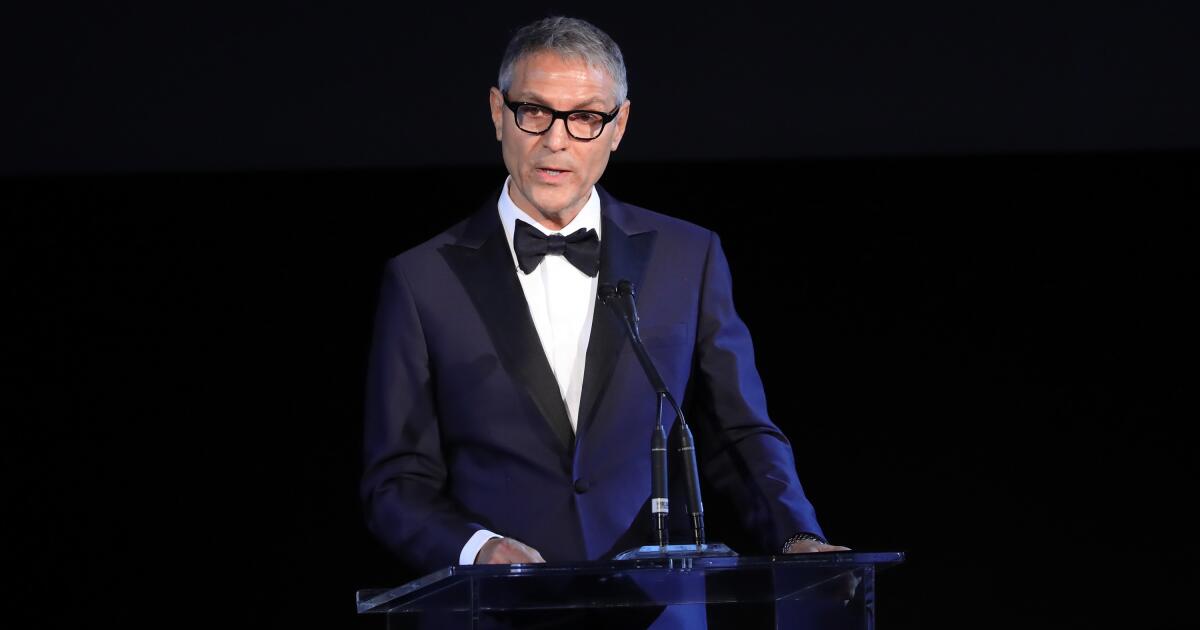
Endeavor Chief Executive Ari Emanuel this week called for Israeli Prime Minister Benjamin Netanyahu’s ouster and denounced his leadership following the Oct. 7 Hamas attack.
The Hollywood power player made the remarks during the Simon Wiesenthal Center’s gala in Beverly Hills, where he accepted the Jewish organization’s Humanitarian Award, its highest honor.
“This is a painful and crucial moment for all of us who are Jews and who love Israel. It is not a moment to stay silent,” Emanuel said Wednesday evening.
“Israel is being led not by a problem solver, but by a problem creator. He is an agent of chaos and hatred and division and destruction. And enough is enough. Bibi Netanyahu is a failure.”
His remarks were met with both cheers and jeers, with some attendees walking out of the Beverly Wilshire Hotel. The audience was filled with members of Emanuel’s family and entertainment industry stalwarts including Larry David, Robert Kraft, Mark Wahlberg and Dwayne “The Rock” Johnson.”
Emanuel, who spoke of his family’s long ties to Israel and who supports a two-state solution, said Netanyahu “doesn’t want a peaceful solution” in the conflict “And it’s become clear that getting to a political solution and Netanyahu remaining in power are irreconcilable paths,” he said.
“As for his responsibilities to keep the people of the state of Israel and Jews across the globe safe, he has obviously failed spectacularly,” Emanuel said. “But he has succeeded wildly in using division to stay in power.”
One of the most powerful executives in Hollywood, Emanuel is also one of the most outspoken. Two years ago he urged businesses to cut ties with the artist formerly known as Kanye West after he made antisemitic remarks. Companies such as Adidas and the Gap stopped working with the rapper and producer.
In 2006, Emanuel wrote an open letter calling on Hollywood to boycott Mel Gibson after his antisemitic rant made during a drunk-driving arrest, saying the actor’s alcoholism “does not excuse racism and anti-Semitism.” Year later, Emanuel accepted an apology from Gibson and supported his return to the film industry.
The Oct. 7 terror attack by Hamas left about 1,200 Israelis dead and more than than 250 kidnapped. Israel’s military retaliation has killed more than 35,000 people and displaced thousands more, according to Gaza health officials. The war has polarized every sector of the U.S., including Hollywood.
Emanuel lamented the civilian casualties and suffering among Palestinians in Gaza. “The loss of even a single innocent child is a tragedy,” he said. But he called Israel’s war “justified” saying “Israel did not start the war in Gaza. Hamas did.”
He also criticized pro-Palestinian protesters using the slogan “from the river to the sea,” which he said means the elimination of Israel. “That’s the definition of genocide,” he said.
Business
Hotel strike nears end as union reaches more tentative deals with holdouts
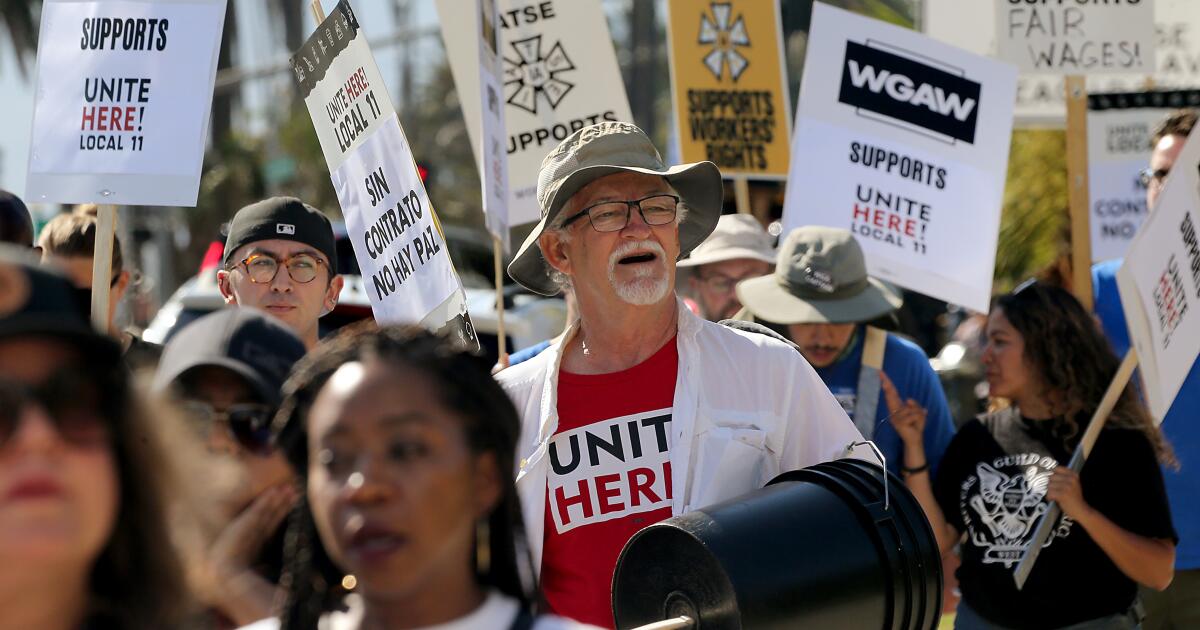
The almost 10-month-old strike that initially involved roughly 60 hotels and more than 15,000 workers in Los Angeles and Orange counties is nearing its end.
In late April, the powerful hospitality union Unite Here Local 11 announced it had reached tentative contract agreements with 12 Southern California hotels. And on Friday, Unite Here Local 11 officials said the union had negotiated agreements with six more local hotels in recent days.
So far, nearly three dozen other hotels have struck deals with workers over the course of on-and-off strikes that began in July. The new contracts awarded higher pay and other benefits to thousands of housekeepers, cooks, dishwashers, servers and front desk workers.
“Hotels are falling in line,” Unite Here Local 11 co-president Kurt Petersen said. “We’re winning more the longer this goes on.”
Stephanie Peterson, a spokesperson for Aimbridge Hospitality, which operates six area hotels that recently settled, said in a statement: “We are pleased to have reached an agreement with the Union that puts our people first, and we are taking the immediate steps to begin issuing the backpay our associates have been waiting for.”
The new contracts include an almost immediate raise of $5 per hour for workers who don’t typically earn tips, including front desk clerks, dishwashers and housekeepers. Those workers will see a total hourly wage boost of $10 over the course of the contract that expires in January 2028.
Hotel Figueroa, LA Grand and Glendale Hilton are among nine hotels whose owners remain in contract negotiations with the union.
A point of contention had been the practice of some hotels recruiting recent migrants living in a Skid Row shelter to replace striking employees.
In a compromise, four hotels agreed to give the migrant workers priority in hiring for permanent positions. The hotels include the Le Meridien Delfina Santa Monica, the Four Points by Sheraton, the Holiday Inn LAX and the Pasadena Hilton.
“This is a testament to the idea of no workers left behind,” Petersen said. “Our members saw workers exploited and had a sense of solidarity. The bosses’ plan to divide people didn’t work.”
As part of the union’s agreement with Sheraton Park Anaheim, workers who had raised allegations of sexual harassment and were banned from the property will be brought back to work.
Fairfield Inn & Suites and Aloft hotels in El Segundo, which are owned by a real estate affiliate of the Blackstone Group, also approved deals with the union.
Blackstone Group spokesman Jeffrey Kauth said, “The agreement substantially increases wages and benefits over the term of the contract and provides a framework to recognize a broader number of employees who will benefit from these increases. We are proud to continue our positive working relationship with the union.”
During months of strikes, tensions have spiked on picket lines at various hotels and have continued at some locations even after deals are struck.
Outside the Hilton Pasadena, a worker and two union members who were picketing were issued noise citations by local police and are facing criminal charges for using handheld bullhorns.
The union as well as advocates with the American Civil Liberties Union of Southern California sharply criticized the city for pursuing the charges at a Monday city council meeting.
Peter J. Eliasberg, chief counsel at the ACLU of Southern California, sent a letter May 15 to Pasadena’s City Council members, chief of police and city attorney urging the city to drop the charges, saying they “very likely violate the First Amendment and Liberty of Speech Clause of the California Constitution.”
Video footage captured by the union’s general counsel Jeremy Blasi, and reviewed by The Times, shows two police officers recording decibel measurements of several picketers on a public sidewalk a few feet away.
“The City supports the free speech rights of protesters and does not take sides in disputes, but must balance the rights of those protesting with those nearby residents and businesses impacted by protest activities,” said Lisa Derderian, a spokesperson for the city of Pasadena, in an emailed statement.
Pasadena Mayor Victor Gordo said the city planned to review issues raised by the ordinance, but said he couldn’t comment on the claims.
Long Beach Mayor Rex Richardson called the deal a “historic contract agreement that ensures hospitality workers will have the dignity of living wages and industry-leading benefits to support their families,” according to a Unite Here Local 11 news release in April.
“Over the next four years, as we prepare for the 2028 Olympics and welcome visitors from around the world to our vibrant Long Beach community, we can be proud that our local tourism economy continues to thrive, while placing value on the workforce that keeps our hospitality industry running,” Richardson said.
Business
As more Californians fall behind in making debt payments, one group stands out
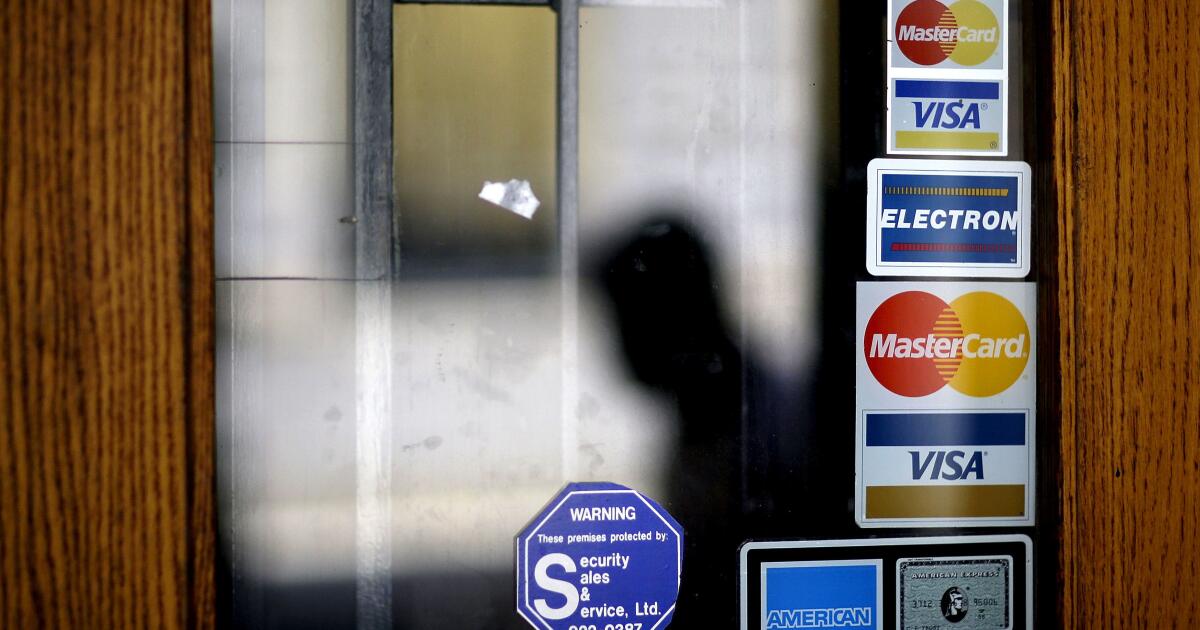
Stubbornly high inflation and interest rates are taking an increasing toll in California as the state experiences rising unemployment and slowing wage gains. And those feeling it the hardest: the largest and perhaps most budget-minded generation of them all.
Millennials, those roughly 28 to 43 years old, are generally thought to be more averse to debt and better savers than earlier cohorts such as Gen X (44 to 59 years old) and baby boomers (60 to 78).
But new data from the California Policy Lab at UC Berkeley show that while consumer debts overall are growing and becoming more difficult to manage for all but the very oldest generation in America, millennials are having the most trouble making their loan payments on time.
In the first quarter, 7.6% of millennial borrowers were at least 30 days late in making monthly payments on their credit card, auto and other loans. That compares with 6% of Gen X, 5.5% of Gen Z (ages 18 to 27) and 3.3% of boomers who fell behind on their loans. The earlier Silent and Greatest generations had even lower delinquency rates.
Unlike for Gen X-ers and boomers, the overall loan delinquency rate among millennials — who make up about one-fourth of California’s population — has now climbed above pre-pandemic levels. And economists worry that financial pressures will only continue to mount, especially with an end to the student loan repayment pause. Among other things, millennials are known for carrying a lot of college loan debt.
“I see no reason to believe that delinquencies aren’t going to be tracking higher,” said Evan B. White, the California Policy Lab’s executive director.
Foreclosures and personal bankruptcies for all ages are still very low by historical standards, as is the percentage of after-tax income that households are spending on making debt payments, another important indicator of financial stress.
Even so, consumers in California and across the country have been taking on more debt in recent quarters, including credit card borrowing. And 30-day delinquencies have been creeping higher — an early warning sign of potential trouble ahead.
Thus far consumer spending, which accounts for most of the nation’s economic growth, has held up well. But many people are feeling the effects of what’s been an extended period of high inflation and interest rates. A pullback by consumers could have a significant effect on the broader economy.
In the Federal Reserve’s annual report on the economic well-being of Americans, also released this week, about two-thirds of adults surveyed said that changes in the prices they paid in 2023 compared with the prior year had made their financial situation worse. And one-fifth of them said inflation had made things much worse.
The Fed report found that 72% of adults were at least “doing OK” financially, similar to the 73% figure in 2022 but well below the recent high of 78% in 2021.
U.S. households continue to benefit from a strong labor market, including solid, if slightly smaller, gains in wages. The nation’s unemployment rate was 3.9% in April, the 27th straight month in which the jobless figure has been below 4% — the longest such stretch since the 1960s.
California’s employment situation, however, has not been as strong. The pace of job gains statewide has lagged behind the nation’s. And California’s unemployment rate of 5.3% last month was the highest in the country, reflecting weakness in key sectors such as entertainment, high tech, and business and professional services. The number of unemployed workers in the state has increased by 164,000 over the last 12 months, according to California’s Employment Development Department.
Meanwhile, wage growth has slowed more in California than for the nation overall — and it’s now running below the rate of inflation, meaning workers’ purchasing power is shrinking.
In the 12 months ending in April, the average hourly earnings for all private employees in California were up 1.4% from the prior year. That’s less than half the rate of both wage growth and inflation for the United States. In contrast, from 2016 to 2022, California employees saw wage gains averaging 3% to 6% per year.
Nationally, aside from student loans, delinquencies on all types of consumer debt have been steadily rising since the end of 2021, according to the New York Fed.
During the first two years of COVID-19, consumers paid down their debts significantly, thanks in part to stimulus checks and other government programs. But since then, credit card delinquencies, in particular, have risen above pre-pandemic levels, and an increasing share of borrowers are maxing out on their plastic, most of them younger adults.
Why millennials seem to be struggling more financially may seem puzzling at first. They’re the best-educated generation and the first to grow up in the digital age. But many millennials also had the misfortune of entering their formative adult lives amid the Great Recession that began in late 2007 and left a trail of job and financial hardships for some years. Saddled with student loans and other debt, they have been slower to move out of their parents’ homes, start families and build wealth compared with earlier generations.
More recently, with home mortgage rates and home prices having soared, many millennials are stuck in apartments and feeling the squeeze of higher rents and prices for certain services that they are likely to need given their stage in life, like day care.
In fact, the Fed’s economic well-being report found that while there was little change for most population groups between 2022 and last year, one notable exception was parents living with their children under age 18. Given that women are having children later, this group would include a disproportionate share of millennials.
“Those are years when you’re moving into higher expenses of buying homes, buying cars and even setting aside money for children’s college,” said Greg McBride, chief financial analyst at Bankrate.com, which has studied generational differences in handling debt. “When we’ve experienced the type of inflation we’ve had, that really puts the squeeze on tight budgets.”
-

 Politics1 week ago
Politics1 week agoVulnerable Dem incumbents move to the center in key swing states as Biden panders to far-left base
-

 World1 week ago
World1 week ago‘Monstrous crime’: World reacts to attack on Slovakia’s prime minister
-

 News1 week ago
News1 week agoHow a migrant aid group got caught up in a right-wing social media thread : Consider This from NPR
-

 Movie Reviews1 week ago
Movie Reviews1 week agoIs Coppola’s $120M ‘Megalopolis’ ‘bafflingly shallow’ or ‘remarkably sincere’? Critics can’t tell
-

 Movie Reviews1 week ago
Movie Reviews1 week agoGuruvayoor Ambalanadayil movie review: This Prithviraj Sukumaran, Basil Joseph-starrer is a total laugh riot
-

 World1 week ago
World1 week agoTaiwan grapples with divisive history as new president prepares for power
-

 Politics1 week ago
Politics1 week agoSouthern border migrant encounters decrease slightly but gotaways still surge under Biden
-

 World1 week ago
World1 week agoSlovakia PM Robert Fico in ‘very serious’ condition after being shot

:quality(70)/cloudfront-us-east-1.images.arcpublishing.com/adn/NKNTJUAVL2FXA2OD45QX74RKPA.jpg)










